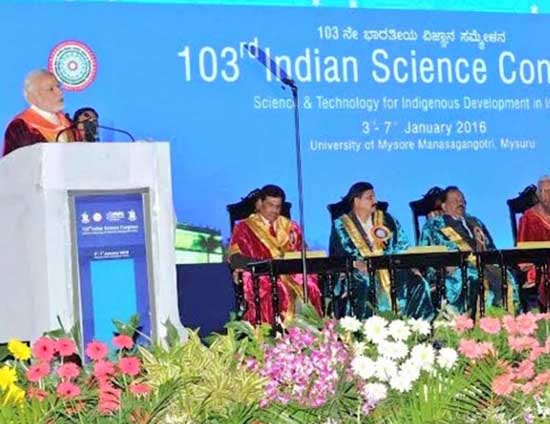MYSURU, Jan 3:
Prime Minister Narendra Modi today told scientists that the government would make it easier to do scientific research in the country and asked them to keep the five principles of economy, environment, energy, empathy, equity at the centre of enquiry and engineering.
Addressing the 103rd Indian Science Congress here, he also said he was encouraging greater scientific collaboration between central and state institutions and agencies as part of cooperative federalism.
“We will make it easier to do science research in India,” said Modi, as the annual five-day mega science event began at the “Manasa Gangotri” campus of the University of Mysore with over 500 eminent scientists and experts from the country and abroad scheduled to address the meet.
He emphasised on what he called “Five Es”, saying the impact of science would be the most when scientists and technologists keep the principles “Economy, Environment, Energy, Empathy, Equity” at the centre of enquiry and engineering.
The Prime Minister also told the scientists that the rising challenges of rapid urbanisation must be addressed as it would be critical for a sustainable world.
“…Cities are the major engines of economic growth, employment opportunities and prosperity… But, cities account for more than two-thirds of global energy demand and result in up to 80 per cent of global greenhouse gas emission…,” he noted.
Modi said better scientific tools must be developed to improve city planning with sensitivity to local ecology and heritage and affordable and practical solutions found for solid waste management.
Stressing that a sustainable future for this planet would depend not only on “what we do on land, but also on how we treat our oceans”, he said the government had increased focus on ocean or blue economy.
“We will raise the level of our scientific efforts in marine science,” he said.
Noting that yet another revolution of empowerment and opportunities in India had been launched, Modi said, “We are once again turning” to the country’s scientists and innovators to realise the goals of human welfare and economic development.
“Our success spans from the core of the tiny atom to the vast frontier of space. We have enhanced food and health security and, we have given hope for a better life to others in the world,” he said.
As the “level of our ambition for our people” was being increased, the scale of the efforts would also have to be increased, the Prime Minister said.
In this context, he referred to good governance and said it is about integrating science and technology into the choices to be made and the strategies to be pursued.
“Our digital networks are expanding the quality and reach of public services and social benefits for the poor,” he said.
Underlining that innovation must also drive the scientific process, Modi said, “We succeeded in bringing innovation and technology to the heart of the climate change discourse.”
“Innovation is important not just for combating climate change, but also for climate justice. We need research and innovation to make clean energy technology available, accessible and affordable for all. We need innovation to make renewable energy much cheaper, more reliable and easier to connect to transmission grids,” he said.
The Indian Science Congress is returning to Karnataka after a 13-year hiatus with Mysuru hosting the event after a 34-year gap at a time when the University of Mysore is celebrating its centenary.
The Congress’ focal theme is “Science and Technology for Indigenous Development in India” in tune with Modi’s big push for “Make in India” programme.
The Congress comprises plenary sessions, Pride of India Expo, Hall of Pride, genesis symposium, Vigyan Jyot, vision talks, women and children science congress, young scientists awards, science communicators’ meet and public lectures.
According to the organisers, the Congress has attracted 15,000 delegates from across the country and abroad from leading research institutes, PSUs, universities and industry.
Science exhibition Pride of India Expo, one of the biggest attractions, will showcase over 450 institutions from public and private sectors, displaying cutting edge innovations. (PTI)


